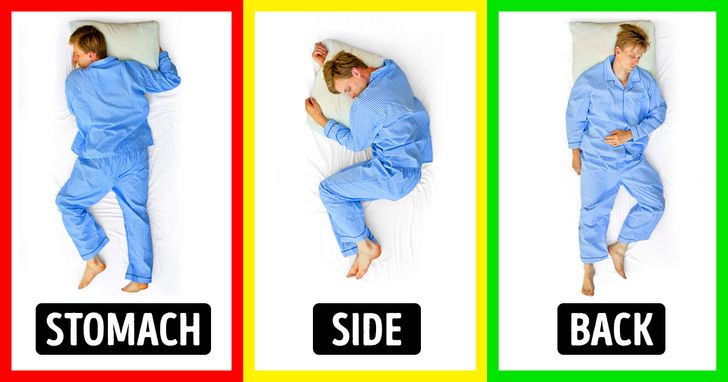In 1964, Randy Gardner was awake for 11 days and 25 minutes. He holds the record for the longest time a human can go without sleep. This was really a rare case, but many of us suffer from insomnia at different periods of our lives. Lack of sleep can negatively affect the body and mind, and it is important to know how to combat this state.
We want to share with you these practical tips on how to combat insomnia and increase the quality of your sleep.
Proven Tips to Sleep Better at Night
Choose The Right Sleeping Pose

If you have trouble sleeping, take a closer look at the sleeping position you choose most often.
Sleeping on your back is one of the best ways to combat insomnia, as it allows your head, neck, and spine to rest in a neutral position. Although this sleeping position is not that popular, experts are sure that it is one of the best options for healthy sleep.
A fetal sleeping position can restrict breathing and cause joint or back pain in the morning. According to statistics, 41% of adults choose the sleeping position of the fetus, which is when they lie on their side with their knees bent. Although this position is recommended for pregnant women (as it improves circulation), it may not be as good for others.
Sleeping on your stomach is probably the worst option for healthy and peaceful sleep. It is difficult to keep your spine in a neutral position while lying on your stomach, which can negatively affect your back and neck. Also, this form of sleep can lead to numbness due to the tremendous pressure on the joints and muscles.
Get Rid Of Your Old Mattress

A bad mattress can also be responsible for your insomnia and other sleeping problems. Experts say that if your mattress is over 7 years old, it’s time to see if it still supports your body adequately when you sleep.
Different parts of our body put different pressures on the mattress and, as it ages, it loses its ability to support the body and ensure good sleep. There is a wide range of mattresses on the market and you can choose the best option based on your body shape, any health problems you may have, and your budget.
Try A Diy “Sleepy Dust” Recipe
If you can’t sleep or wake up suddenly in the middle of the night, try this “sleepy dust” recipe, for which you’ll only need a little cane sugar and sea salt. Sugar has a calming effect, while salt helps the body control its adrenaline levels. Put the mixture under your tongue and it can help you solve your sleep problems.
Practice Evening Journaling
If your thoughts run in circles, it can increase your anxiety level and prevent you from falling asleep. Before going to bed, take 15 minutes to write down all the positive events that happened during the day.
This technique will help you focus on the good things, reduce your stress and anxiety level, and improve the length and quality of your sleep.
Limit Your Naps

Many of us think that taking a nap during the day is a good way to catch up on the sleep you lost the night before, but that’s not how it works. Naps can lower the quality of your night’s sleep, but if you can’t do without them, make sure you don’t take long or nightly naps.
Studies have shown that those who nap for more than 2 hours or those who sleep between 6:00 6 p.m. and 9 p.m. have the worst quality of night’s sleep. If you don’t want to risk sleeping, take a nap during the day (before 6 p.m.) and avoid naps that last longer than 2 hours.
Keep The Clock Out Of Sight
Watching time go by will only increase your tension and anxiety and keep you from falling asleep. Keep your clock and alarm in a place where you cannot see them and try to create a relaxing atmosphere in your room without disturbing noise or lights.
Which of these tips would you like to try? Do you have your own ideas on how to combat insomnia? Feel free to share your opinion in the comments!


